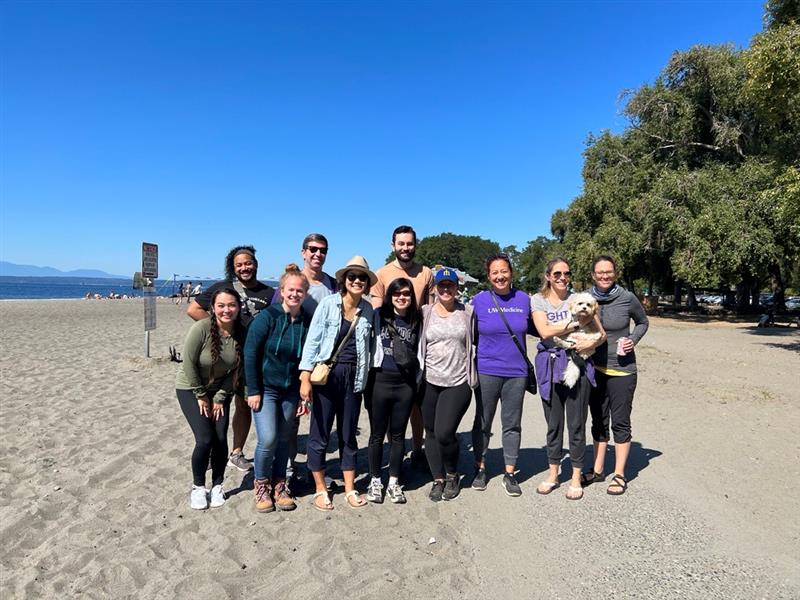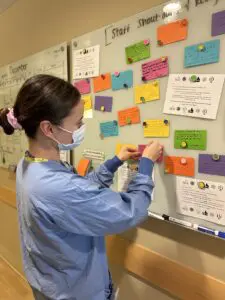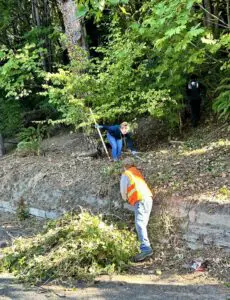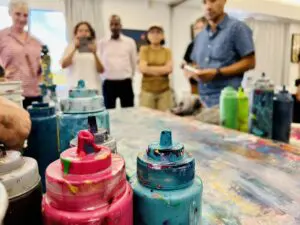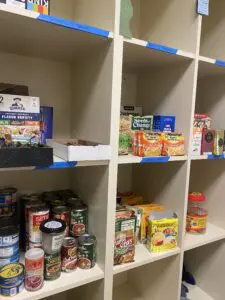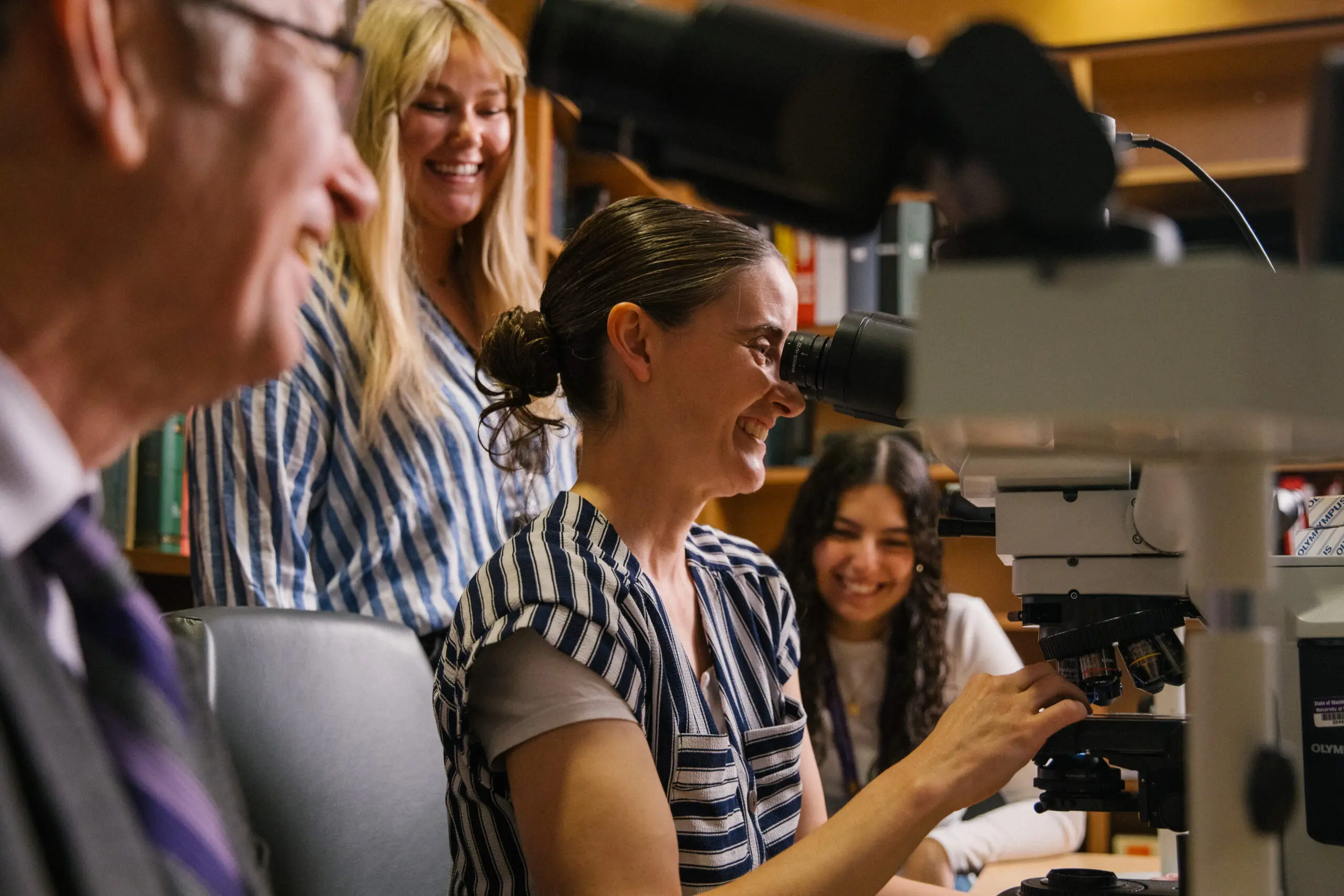Walk into Harborview’s Interpreter Services Department (ISD) office in the Patricia Steel Building, and you’ll find a large painting of colorful flowers with what appears to be a watery blue braid winding through, adding warmth and beauty to the space.
But the artwork wasn’t purchased from a gallery. Instead, the piece is the culmination of a team-building project held by the department and made possible by donor support.
The ISD helps ensure all patients receive safe, high-quality, culturally sensitive healthcare by offering language access for those with a language of care other than English. Historically, the department holds an annual, day-long retreat to explore topics like racial and socioeconomic inequities in healthcare, explore self-care activities and engage in team building.
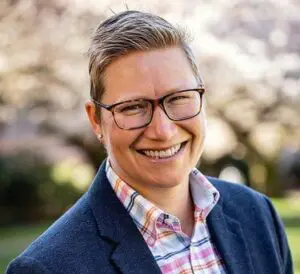
Anne Browning, PhD, MA
But when the pandemic hit, like so many other healthcare professionals, the team put their own needs on the back burner to handle the surge of patients. And what seemed, at first, like a sprint turned into a marathon, straining not just the fiscal resources of hospital systems, but also the emotional health and well-being of care providers.
It’s a problem faced by health systems nationwide. A recent study conducted by the Centers for Disease Control and Prevention found that during the years of the pandemic, healthcare workers reported nearly five days of poor mental health a month, with one-third grappling with depression symptoms and over half experiencing anxiety symptoms.
That toll is something that Anne Browning, associate dean for well-being at UW Medicine, thinks about every day.
“Healthcare workers tend to sacrifice some of their needs in order to take care of patients,” says Browning. “And especially during COVID, when the chips were down, our team showed up and kept pushing, kept sprinting, even when their own reserves were really low.”
The fallout has been significant – a UW Medicine study found that over half of its workers were experiencing high levels of burnout, a figure which mirrors national trends.
A community approach to well-being
Intervention strategies found effective in combating burnout include fostering peer support among colleagues, enhancing mentorship opportunities and offering wellness activities.
As the surge of acute care needs for COVID patients began to wind down, UW Medicine leaders looked for ways to use remaining COVID emergency response funds contributed by donors to help workers recharge, reconnect and build that sense of community. They landed on a grassroots approach, offering well-being grants to support activities, programming, projects and applied research to improve the work and learning environment. Teams within UW Medicine could submit proposals for grant awards between $500 and 5,000.
“We’re never going to be as creative as the teams themselves coming together to think through what would be fun and meaningful for them,” said Browning. “Our hope has been that by giving people some agency and resources to be able to do what they wanted in terms of improving well-being for their local spheres, it’ll help move the dial across our entire system.”
The grant selection committee anticipated receiving at least 50 proposals. If they reached 100, they’d consider it a huge success.
They received over 300.
“I think it was an incredible demonstration of how much people are engaged and want to put their own time and energy into developing the well-being of their workplaces,” said Browning.
For 2023, 65% of the proposals were selected for full or partial funding, totaling $250,000. Projects encompassed everything from outdoor team-building excursions to improving break spaces, therapy animal visits, quick meals for neurology residents called for last-minute shifts, as well as a book club focusing on leadership development and diversity, equity and inclusion.
The big impact of small grants
For the ISD staff at Harborview, the grant provided a chance to reunite in person for the first time since 2019. They invited David Johansson, a local artist and group facilitator, to guide them in the creation of a collaborative painting.
Nityia Przewlocki, a web info specialist for the department, said the joy of creative expression yielded a greater sense of cooperation and purpose. “In the span of two hours, the team collectively created a large-scale, display-worthy piece of art. Its rich and vibrant colors serve as a daily reminder to reflect on the moments of our day and create a more beautiful world for everyone.”
A grant awarded to the UW Division of Physical Therapy helped address food insecurity faced by students and residents by stocking a “little free pantry” with food, hygiene and toiletry items, as well as providing community-building meals. It’s already having an impact, with one pantry user saying, “I think it’s great that we’re able to directly meet the needs of students struggling with food insecurity.”
Even something as simple as a series of bulletin boards has had a big impact on the Interventional Radiology (IR) team, which used its grant to enhance team connection and collaboration. The team created a calendar with staff events, birthdays, holidays and meetings, a “Pets of IR Board” with a star pet of the month and a recognition board for staff shout-outs from both patients and other staff members.

Staff from the Digital Health Office took a break from clearing trails at Golden Gardens to pose for a group photo.
One staff member said, “The boards literally brighten my day every time I see them. They have brought a sense of belonging, collegiality and kindness to our everyday lives here at the UW.”
And for the primarily remote UW Medicine Digital Health Office — which was officially launched in the summer of 2022 — the well-being grant offered a much-needed opportunity to connect in person and give back to the community in the process. They held a volunteer work party in Golden Gardens, repairing trails for visitors while promoting collaboration and community-building within their newly formed team.
“We cleared invasive species from a large section of a local park and built new bonds through teamwork, shared struggles and shared success,” said Josh Palega, digital transformation lead. “That’s translated back to our work lives by allowing us to see one another as uniquely equipped and capable members of a team that can achieve much more together than any one person can on their own.”
Caring for caregivers
Browning notes that donors play an incredibly important role in supporting the well-being of UW Medicine’s healthcare teams so that faculty, staff and trainees feel like their work is meaningful and appreciated.
“When we’re faced with tight budgets and have to make decisions about where we spend funds, it can be hard to justify these kinds of small initiatives that have a big impact on the well-being of our teams, who typically sacrifice their own needs to take care of everyone else,” Browning said.
“That’s why the generosity of donors is so important. It’s a way for our community to express appreciation and support and give our teams permission to refill their tanks.”
She adds that supporting the health and well-being of healthcare workers is key not just for caretaking the community now, but for also the days to come.
“We know we will continue to need our healthcare teams to deliver incredible care, and we know that there will likely be more moments of challenge and potentially even crisis that we’ll face within healthcare,” said Browning. “Our teams will be ready, and they will respond. But the more we can help them take care of themselves and each other now, the better we’re going to be.”
Written by Nicole Beattie


